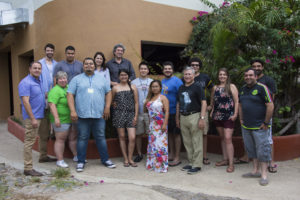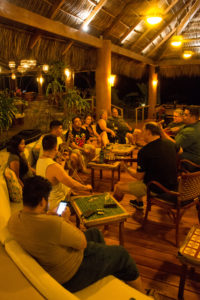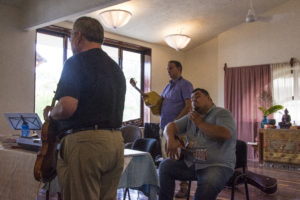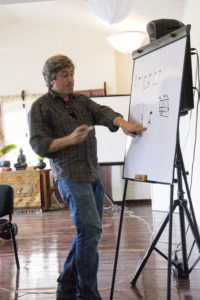A group of mariachi educators from both sides of the border gathered in early June to compare techniques, share best practices and talk about the transformations they see in their communities.
Called the Chacala Mariachi Institute, the event is in its second year, organized by Dr. Jeff Nevin of Southwestern College in California.
Set in the breathtaking jungle beauty of Mar de Jade resort in Chacala, Nayarit, with the surf rolling into the shore and sea birds overhead, the idyllic setting was the perfect place to get away from daily life and focus on the future of mariachi education.
The participants came from a variety of different backgrounds. Some taught groups of community members of all ages. Some were former band and orchestra teachers (all of those currently teaching mariachi). Others were specifically mariachi program leaders. The length of time their programs had been around likewise varied, although most were under 8 years. Some of the teachers were quite young, some older, some from urban settings, some rural. All were very passionate about what they do and why they do it.
Clinicians including violinist David Gill, Mariachi Aztlan de Publo High School director John Contreras and opera/mariachi singer Perry Chacon joined Nevin in the week of well organized discussions. On the technical side there were demonstrations of classical and mariachi violin and trumpet technique, such practical and important matters as how to teache youngsters to sing more comfortably and confidently, how to use a pick for the guitars and vihuelas, best practices for notation, fundraising, school resources, gaining administrative and community support, and much more.
At every turn, the participants became the students, having to themselves try out the techniques being discussed. Similarly each had the opportunity to demonstrate how they work with their students back home, this time using their fellow teachers as an impromptu mariachi.
Like every mariachi conference one might attend, the nights were filled with jam sessions that displayed not just virtuosity and vocal prowise but great passion for the music. And all of the elements of the gathering were about team building. The communication and sharing of information would continue long after they boarded planes to head home.
One morning the discussion turned to why each of the teachers does this. The answers were profound and deeply personal. One saw in their faces and heard in their voices the level of commitment each has and how profoundly the experience has touched them all.
It was a very different experience from the mariachi conferences where students learn music from master musicians and teachers join them in various ways. Here they were sharing with peers the wisdom they have gained, as well as the struggles they have. And they were getting practical advice to take back to their classrooms and become even better mariachi teachers.
As someone seeking answers to how youth mariachis have changed my own community, it was a huge affirmation to hear that similar transformations are occurring all over. And as one who has written for decades about the challenges of mariachi education, it was heartening to see something powerful being done to better equip teachers to do the job they are so passionate about.





